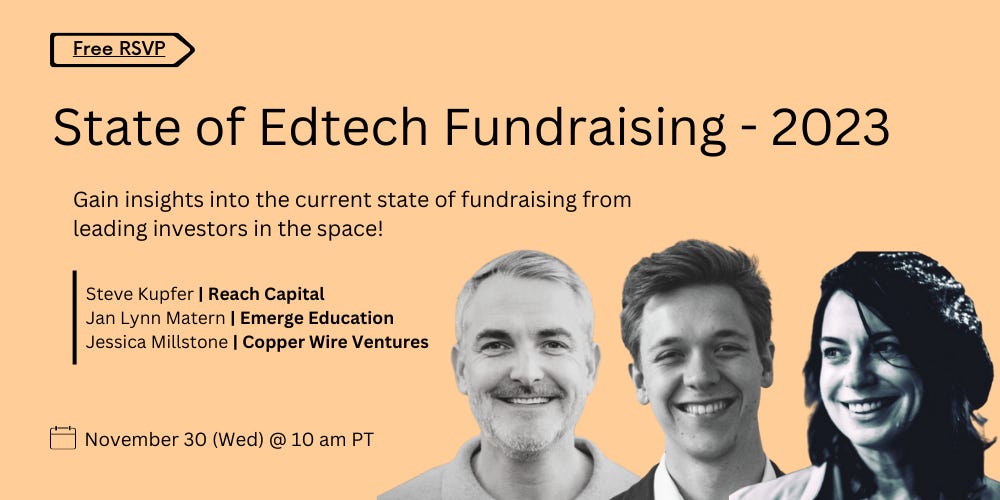2023 State of Edtech Fundraising Transcend 💵 Newsletter #60
Insights from leading Edtech investors and the road ahead for early-stage founders
Hi there! Alberto here, from Barcelona this week.
The Transcend Newsletter explores the intersection of the future of education and the future work, and the founders building it around the world.
We welcome 230 new readers to the newsletter since our last post. If you love reading about the future of education and work, hit the ❤️ button and share it with your friends!
2022 has been a weird year for founders.
I don’t need to tell you that the world has changed drastically since November of 2021, but how much exactly has that happened for founders building the future of learning and work?
That’s exactly the question we wanted to answer, so we surveyed some of the leading investors and founders in the space to clarify what they are seeing.
We’ve summarized all of our learnings into 5 lessons, and 5 areas of advice for founders navigating fundraising today. All of the answers you will see here apply to Q4 of this year (compared to previous quarters in 2022) and also predictions for 2023.
We will also be hearing directly from investors this coming Wednesday, November 30, at our Open Discussion!
If you are building in this space, have considered raising funds, or are simply curious about Edtech and have questions to ask, 👉RSVP for this session here!
Welcome to the 2023 State of Edtech Fundraising!
Fundraising Today
2022 has been a difficult year. Increasing geopolitical conflict, rising inflation globally, and skyrocketing energy prices have sent the world into a recession (or soon-to-be-recession if you are an optimist).
This has affected the capital markets in a big way, and the fundraising environment for startups has gotten a lot colder. In the last quarter, total funding into startups globally declined again and is now 53% down compared to last year. Early-stage funding is doing a bit better than late-stage, at 39% down year over year.
This investing winter is affecting everybody, starting from LPs (Limited Partners, the investors in venture funds whose portfolios are down across the board), to funds (who can’t raise more funding and are investing more slowly), founders (who are the ultimate recepients of the funds), and their customers (who have smaller budgets to spend).
This is no different in edtech, where the market has felt significantly less optimistic. So we asked the top investors in edtech what they are seeing, mainly at the early-stages of funding, and we summarized everything we learned into 5 lessons and 5 areas of advice for founders.
5 Learnings about Edtech Fundraising
#1: Rounds are smaller and at lower valuations
To no one’s surprise, 2022 has been all about smaller rounds at lower valuations. Of all the investors we spoke with, 73% said they were investing at lower valuations compared to earlier in the year. There is also a significant reduction in the sizes of the rounds and number of investments (45% of surveyed investors are investing less than earlier in the year).
Deborah Quazzo described a great “mismatch” between the expectations of financing markets and founders: as money is scarce for investors, the bar has been raised for investment. Investors are asking for more data, more time, and more traction to make investments. As angel investor Michael Hauge commented, “it seems like no one has time for 'idea-only/team-only' investments”.
#2: Profitability is the new North Star
With the bar raised for founders to raise, the north star has changed from traction to profitability. Angel investor Rob Cohen sees founders moving from the “growth at all costs” model, and towards profitability. In 2021, founders could always take on more funding to stay in business despite losses, but that’s not the case in 2022. Investors are looking for businesses that can sustain themselves through a recessionary period, who operate in validated markets and can be profitable from the early days.
Jan Lynn Matern (Emerge Education) summarized it best:
“the market environment in which you operate dictates how you have to build your company. In 2021, when funding was abundant, top-line growth was the north-star metric for investors. Now it's profitability”
#3: The year of the extension round
The most common challenge I’ve heard this year from founders fundraising is finding a lead investor. So many founders could secure small angel checks and commitments from new investors, but couldn’t find a new investor to set the terms and invest a significant amount of the round.
That’s why Dan Carroll (angel investor), Ben Kornell (Common Sense Media and Aprender) and Yigal Kerszenbaum (JFF Ventures) all agreed: 2022 is the year of the extension round, with no signs of stopping next year. A lot of founders who wanted to raise a Series A are simply extending their seed round with their past terms, and taking smaller rounds with higher dilution, and most often closing rounds with a lead investor.
#4: The powder is dry
It’s not that investors don’t have capital to invest, for now. It’s that they are sitting on that capital without investing it, what’s usually called dry powder. Dry powder is at an all-time high, as many funds raised capital last year, but aren’t certain about the macroeconomic situation to deploy it.
One founder who is actively fundraising mentioned “it has been relatively easy to get meetings, but the process seems to be moving slower than usual as investors are being more cautious. Also, some have admitted waiting to see what happens with the macroeconomic environment and think it will be better / have clarity in Q1 2033”.
82% of the investors we talked to are maintaining the same fundraising pace for their own funds, but it’s getting harder to get commitments. My prediction is that they will eventually invest that capital, but will do so at a lower pace and write smaller checks, to make the money live longer.
#5 Generalists are (mainly) out. Edtech funds are in.
A big factor in the growing investment into edtech in recent years was that generalist funds saw edtech as an investable sector. These were generally larger funds that participated in growth-stage rounds, and inflated the funding numbers and valuations.
A lot of these investors want nothing to do with education, once again.
That’s generally fine – investing in education and in startups in general are two different games with different exit scenarios. While VCs depend on a few outlier startups that return 100x their investment through IPOs, education exits are smaller but more frequent. Most of them happen through PE buyouts or strategic acquisitions.
IPOs this year are down bad, but acquisitions and buyouts for edtech startups are holding up and staying at 2020 levels. This is an opportunity for edtech-specific funds to step in and fill the current funding gap.
Here’s a quick overview of the insights we received through our investor survey:
Overall, investors are keeping busy meeting LPs and new founders, but they are not investing as much as there is less pressure to deploy quickly. Everything is taking longer, deals are getting done at lower valuations, and with smaller checks.
Well, that’s kind of depressing. We wanted to get more practical, so we asked investors for more advice for founders to navigate this venture winter. Here are the five areas of advice they gave us.
Looking to 2023: What should founders do?
#1: Plan for preservation
The next years won’t be easy, as almost 65% of investors are planning to invest the same or less heading into next year. If you are a founder, you should be making the changes to your product, company or funding that allow you to be sustainable through those years.
Jan from Emerge Education makes a helpful summary of what this should look like for companies:
Early stage companies need to prioritise strong user engagement and revenue retention over growth, because these are the vital indicators of sustainability.
For growth stage companies, this means ideally reach profitability with current funding or have a credible narrative as to why and how you can reach it with the next round of funding.
#2: Not all paths lead to VC
This recession is highlighting other models of investment that better suit education startups. One founder commented on the “shift away from traditional VC fundraising, to more creative paths - debt, corporates, family offices”. He concluded that “Education exits don’t need to be like fintech / crypto 100x exits”.
This was echoed by Jessica Millstone (Copperwire Ventures):
“Venture capital is often not the right kind of money for a pre-seed company anyway - especially one in the edtech space - so the challenges in raising traditional VC could force some best practices that pay off (literally!) in the long run.”
Lastly, Steve Kupfer (Reach Capital) added that other instruments like revenue-based finance or venture debt are becoming more popular for founders who’d rather not take venture capital to avoid dilution.
If you are thinking of fundraising, think about whether VC is really the right type of funding for the organization you are trying to build in the first place.
#3: Build relationships
When the market isn’t booming, relationships drive dollars. This often gets in the way of democratizing investment, but it doesn’t have to be that way! You can do so by being proactive in reaching out to investors, developing a presence online, building community and seeking intros from the network you build.
Jessica also emphasized this in her advice for founders: “it may sound counterintuitive but I believe it is even more important for founders to be selective in a challenging fundraising market. My advice is to think more creatively about who could be a potential investor, which could include strategically valuable customers and/or bizdev partners”
Joining fellowship and accelerators, founder communities or social media are great ways to get started.
#4: No lead, no problem
One of the main blockers we are seeing among founders in our community is the lack of lead investors. This is crucial at later stages, but at the early-stages, particularly when raising from angels or small funds and using SAFEs or convertible notes, the role of the lead is less important.
Sometimes you’ll just have to set the terms yourself, adapt them to the feedback of the market, and take in small checks to cover your funding needs.
#5: New themes for 2023
We asked investors what themes they were excited to invest in next year. Here are some of the themes that came up:
Upskilling programs that can reach scale, particularly when learners look for new jobs during a recession. There’s an emphasis on new jobs like digital skills or green jobs.
Serving traditional sectors with new approaches, like the manufacturing space, corporate learning or K-12 professional development.
New technologies like generative AI, as well as some web3.
Consumerization of education, building edutainment and product-led growth startups in new markets like early childhood or alternative high school models.
Overall, it looks like we are headed for some rocky years. Founders should be aware of this build startups that can be resilient to make it to the other side, and hopefully this report helps you identify those opportunities.
Want to learn more from some of the investors we talked to?
Join our Open Discussion next Wednesday November 30th with Jan Lynn Matern (Emerge Education), Jessica Millstone (Copper wire Ventures) and Steve Kupfer (Reach Capital).
At Transcend, we constantly think about how to support founders raising their first rounds of funding in the space. If this is top of mind for you and would like some support, you should sign up to our Fellowship waitlist to learn about our upcoming events and programs!
Big big thank you Yigal Kerszenbaum (Jobs for the Future), Katelyn Donnelly (Avalanche VC), Jan Lynn-Matern (Emerge Education), Jessica Millstone (Copper Wire Ventures), Steve Kupfer (Reach Capital), Deborah Quazzo (GSV Ventures), Michael Hauge (Angel Investor), Dan Carroll (First Round Capital), Ben Kornell (Common Sense Growth Fund) & Rob Cohen (Angel Investor) for sharing their insights with us!
The Roundup ☀️
🤝 ASCD & ISTE to Merge in Partnership Aimed at Reducing Education Silos - Read more.
🖥️ Simplilearn raises $45M led by GSV ventures. Read more.
🎮 China emphasizes education, sci-tech, talent in modernization drive. Read more.
Thank you for reading!
Did you enjoy reading this piece?
Hit the ❤️ button to help us reach more awesome people like you!











Alberto: Very meaningful content as always. It is great that you shared about how education investment is different from just the regular startup investment. Also, the point about the education sector offering exit options through strategic acquisitions is absolutely accurate. I am glad someone is talking about these valuable data points.
Akhil Kishore
Partner - GIA ADVISORS